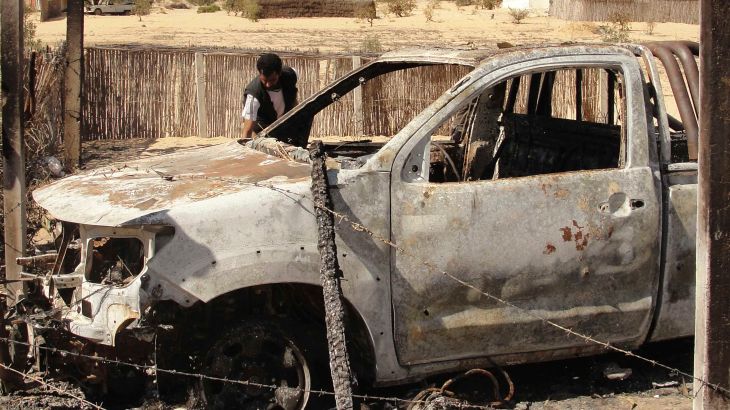
Sinai on the brink
Can stability be brought to the volatile region that is home to one of the world’s most important waterways?
The Sinai Peninsula has been the scene of growing instability. Fighters in the region have ramped up their activities since Egypt’s former president, Mohamed Morsi, was deposed, and there has been an increase in fighting between Egyptian security forces and armed groups.
The security headquarters for north Sinai were attacked by suicide bombers on Wednesday. One car with explosives blew up at a checkpoint, while another hit the main building. No group has yet claimed responsibility for the attack.
We have seen an increasing amount of these sorts of attacks .... Who is behind them is a very difficult thing to know. In some cases we've got groups that appear to be potentially linked to various al-Qaeda factions ... but then in other cases it seems to be much more linked to ... bedouin local problems and issues.
The army has carried out a campaign against so-called terrorist groups with air strikes from Apache helicopters. But activists say the army has destroyed houses owned by civilians, as well as mosques, and that civilians have been killed and injured.
“It was night. I was with my cousin who gave me a lift. Then a helicopter came and hit us. It killed my uncle. I was injured,” one child from the region told Al Jazeera.
The union that represents many of the main bedouin tribes in the Sinai has described the military campaign as a genocide.
“What happened today and yesterday is a shame on the conscience of the Egyptian government. The army has destroyed more than 50 houses, burnt more than 30 cars and killed our cattle and camels. It is a real tragedy,” Sheikh Ibrahim al Mene’e told Al Jazeera.
The volatile Sinai region is a triangular peninsular between the Mediterranean Sea and the Red Sea. It borders Israel and the Gaza Strip, and serves as a bridge between Asia and Africa. Around 600,000 people inhabit the area, the north part of which is one of Egypt’s poorest governorates.
It is also home to the Suez Canal – a narrow gateway that serves as a transport link for oil and liquefied natural gas bound for Europe and the US. About three percent of the world’s oil supply goes through the canal and revenues from it contributed $2.4bn to the Egyptian economy this year.
The canal is also used by the US to move its navy’s aircraft carriers and other warships deploying in the Red sea.
So, who is behind the latest attacks in Sinai? And can Egyptians rein in the armed groups, and bring peace to the home of one of the world’s most important waterways?
To discuss this, Inside Story, with presenter Jane Dutton, is joined by guests: Omar Ashour, a senior lecturer in security studies at the University of Exeter and author of The De-Radicalization of Jihadists; Raffaello Pantucci, a research fellow at the Royal United Services Institute; and Abdel Hady, a professor of Islamic thought and culture at Qatar University
|
“The situation is quite chaotic. Nobody has a really clear answer about what is going on in Sinai. [But it] is not only about the Sinai … there [are] also issues in the east borders, in the south borders … those … areas have [gone] through much discrimination over the years, during Mubarak’s time and even before …. They have been suffering … in a sense that they’ve [not] been allowed [to have] proper education … they’ve been not allowed to be part of the army, [and] they’ve been not allowed to even own the land [where] they are living ….” Abdel Hady, a professor of Islamic thought and culture |